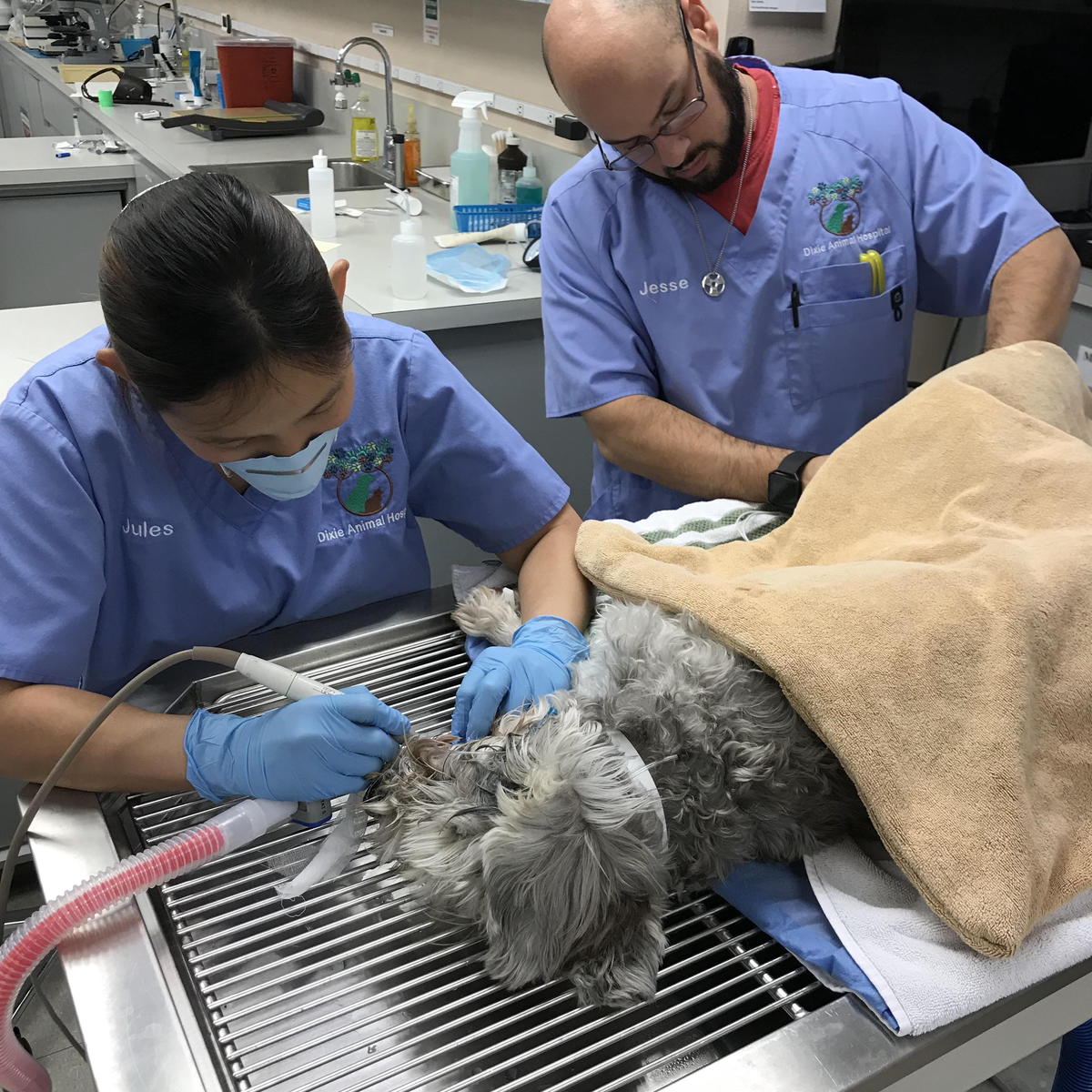A Vet Tech Series: Meet Jules Kreisberg and Jesse Tamayo
- posted: Oct. 18, 2018

From October 14th to October 20th we celebrate National Veterinary Technician Week. During this time we take a moment to highlight the behind-the-scenes work that our technicians and nurses perform on a daily basis. The theme of this year's Vet Tech Week is "Veterinary Nursing in Action". We have nine caring, compassionate technician and nurse staff who do the hard, dirty work that goes unnoticed each day. Join us as we highlight these excellent team members throughout the week.
Our third entry in this series takes a look at Jules Kreisberg and Jesse Tamayo. Jules is a Certified Veterinary Technician who has been working with Dixie Animal Hospital for 4 years. Jesse went through the veterinary assisting program at Felix Varela High School and has worked with Dixie for 2 years. Their combined knowledge is an integral part of our learning system at Dixie Animal Hospital.
Why did you choose this field?
Jules Kreisberg (JK): It seems cliche, but I've always loved animals since I was a child. When I was 5 years old, I was a member of the Girl Scouts. I remember one of our leaders had asked what we wanted to be when we grew up and I had said a "dog doctor". I must have been pretty determined because I went on to become a Certified Veterinary Technician.
Jesse Tamayo (JT): Honestly, when I was in high school at Felix Varela I felt like there wasn't any "good" options for electives. The one program that caught my eye was veterinary medicine. I've since moved paths and am studying for medical school, but being in the veterinary environment has definitely started my preparation for what I would need in a hospital or physician's setting.
What is a typical day for you like?
JK: Right away I usually start my day by checking on the overnight animals; those being the hospitalized patients and the boarders. As the surgeries start rolling in, I am getting complete medical histories and preparing the patients for their procedures. Before we get into the surgical suite, we go through the appointments, run lab work, place catheters and more. All the while, we are establishing client relationships and rapport so that our clients feel confident leaving their loved ones in our hands.
JT: I try to start my day off by writing up and reviewing invoices for any patients going home that day. I get a lot of time working with the dentistry patients and performing dental x-rays. I always seem to be the second to be called for fractious cats as well so I can usually anticipate that (when Liah isn't around).
No job comes without challenges. What is the most challenging aspect of your job?
JK: The most challenging or difficult part of my job? Dealing with cats. I love them and I don't take it personally, but a lot of cats outside of their normal environment become difficult to handle. I can understand why they behave that way though; who wants to be woken up from their first catnap of the day only to be shoved in a plastic box and taken to the "white coat human" to be stuck with needles?
JT: I think everyone can share the same sentiment when we say that euthanasias are the toughest part of what we do. You never want to become overly invested in the exam rooms, but sometimes you can't help but wear your heart on your sleeve when you've grown attached to a pet over years of their lives at the clinic.
What has become the most rewarding aspect of your job?
JK: I love having the ability to turn the negative into a positive. I have a naturally positive outlook on everything in my life, so it's always rewarding to be able to help a sick pet feel better. Seeing their demeanor change over the course of treatment is rewarding enough for me.
JT: Puppies. Who doesn't love puppies? Being able to cuddle with the cute little ones, then watching them grow up over their first years are especially rewarding.
What professional experience stands out among the rest for you?
JK: I remember one of my first experiences dealing with a Bufo toad case. I thought that was it for the pet. It looked like it was in such rough shape and I wasn't sure how we could turn it around. We immediately fell into our heart-pumping, thrilling roles as emergency technicians and went to work; cleaning out the mouth from any leftover debris, administering anti-seizure medications, bringing down the rising temperature with ice packs. Within a half hour, our patient was returning to a stable state. By that afternoon the pet was completely back to normal and we were able to send them home happy and healthy to their loving family.
JT: I recall a situation that came up during my work through the high school program. As high school students, we didn't get a lot of hands-on exposure, but we were great for bathing and grooming. One day we had a pet come in that was infested with everything; the dog had ticks, maggots and mange all rolled into one. For most people this was a gag-inducing experience, but for me it was one of the coolest things during my high school program. I guess I like the gross stuff that most others probably can't stomach.
This is the third in a series of Dixie Animal Hospital technician/nurse profiles that will run throughout the week in celebration of National Veterinary Technician Week.
Location
Find us on the map
Dixie Animal Hospital
14701 S Dixie Hwy
Miami, FL 33176, US
Office Hours
Our Regular Schedule
8:00 am - 5:00 pm
8:00 am - 5:00 pm
8:00 am - 5:00 pm
8:00 am - 5:00 pm
8:00 am - 5:00 pm
8:00 am - 2:00 pm
Closed

